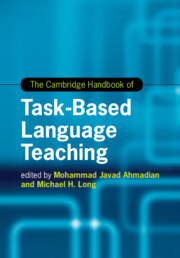Book contents
- The Cambridge Handbook of Task-Based Language Teaching
- Cambridge Handbooks In Language And Linguistics
- The Cambridge Handbook of Task-Based Language Teaching
- Copyright page
- Dedication
- Contents
- Figures
- Tables
- Contributors
- Preface The Origins and Growth of Task-Based Language Teaching
- Part I The Rationale for Task-Based Language Teaching
- Part II Tasks and Needs Analysis
- Part III The Task Syllabus and Materials
- 6 The Cognition Hypothesis, the Triadic Componential Framework and the SSARC Model
- 7 From Needs Analysis to Task Selection, Design, and Sequencing
- 7A Task-Based Telecollaborative Exchanges between US and Italian Students
- 8 Exploring the Nuts and Bolts of Task Design
- 8A Designing Pedagogic Tasks for Refugees Learning English to Enter Universities in the Netherlands
- Part IV Methodology and Pedagogy
- Part V Task-Based Language Teaching with School-Age Children
- Part VI The Teacher in Task-Based Language Teaching
- Part VII Task-Based Assessment and Program Evaluation
- Part VIII Research Needs and Future Prospects
- Index
- References
7 - From Needs Analysis to Task Selection, Design, and Sequencing
from Part III - The Task Syllabus and Materials
Published online by Cambridge University Press: 19 November 2021
- The Cambridge Handbook of Task-Based Language Teaching
- Cambridge Handbooks In Language And Linguistics
- The Cambridge Handbook of Task-Based Language Teaching
- Copyright page
- Dedication
- Contents
- Figures
- Tables
- Contributors
- Preface The Origins and Growth of Task-Based Language Teaching
- Part I The Rationale for Task-Based Language Teaching
- Part II Tasks and Needs Analysis
- Part III The Task Syllabus and Materials
- 6 The Cognition Hypothesis, the Triadic Componential Framework and the SSARC Model
- 7 From Needs Analysis to Task Selection, Design, and Sequencing
- 7A Task-Based Telecollaborative Exchanges between US and Italian Students
- 8 Exploring the Nuts and Bolts of Task Design
- 8A Designing Pedagogic Tasks for Refugees Learning English to Enter Universities in the Netherlands
- Part IV Methodology and Pedagogy
- Part V Task-Based Language Teaching with School-Age Children
- Part VI The Teacher in Task-Based Language Teaching
- Part VII Task-Based Assessment and Program Evaluation
- Part VIII Research Needs and Future Prospects
- Index
- References
Summary
Needs analysis has been proposed as a professional inquiry into second language learner needs that should inform task and syllabus design. These two areas, however, have been studied separately. We focus on the interface between learners’ needs and our macro and micro decisions during task and syllabus design. Needs analysis and its dimensions are defined by addressing important theoretical and methodological issues. We relate then relate needs analysis to the issue of how it may aid the highly complex decision regarding how tasks may be selected. We also inspect how needs analysis may directly and indirectly inform task design. Finally, we address the issue of how task sequencing may also be aided by needs analysis.
Keywords
Information
- Type
- Chapter
- Information
- The Cambridge Handbook of Task-Based Language Teaching , pp. 226 - 249Publisher: Cambridge University PressPrint publication year: 2021
